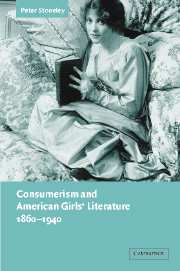1 - The fate of modesty
Published online by Cambridge University Press: 22 September 2009
Summary
Girls' fiction came to prominence in the newly invigorated, post-War publishing market, most obviously as a compromise between “preachy” children's fiction and the often sensational domestic novel. Girls' fiction was less heavily didactic than pre-War children's stories, but it did seek to moderate the sentimental and melodramatic “excess” of the domestic narrative: it offered lively but stable and small-scaled narrative trajectories that would be suitable for young, impressionable readers. The leading exemplar of this first generation of girls' fiction, Louisa May Alcott, was typical. In her the realist disapproval of sensational excess was combined with a moralized disapproval of personal immodesty. But her moralized realism was at odds with the consumerizing, gilded age culture within which it emerged. A writer such as Alcott was placed in a false position in that her success, and that of the consumerist economy, were both fuelled by a desire for more. Writers might set themselves against what they perceived as selfish and immodest impulses towards gratification, but their sales depended on the resilience of these same impulses. This first stage of girls' fiction seems to bear out Walter Benn Michaels's analysis of realism more generally, in that realism is both opposed to and complicit with the unlikely and immoral gains of an expanding, speculative economy. The intense pleasures of sensational and material excess must be present as a possibility, even in the realist novel; but the logic and the morality of realism dictates that pleasure be segmented into acceptably modest moments.
- Type
- Chapter
- Information
- Consumerism and American Girls' Literature, 1860–1940 , pp. 21 - 36Publisher: Cambridge University PressPrint publication year: 2003



